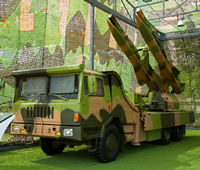Will the worldwide recession actually benefit Chinese arms exports? That's what WPR managing editor Judah Grunstein speculated last week, citing Chinese defense companies' ability to reproduce foreign weapons systems and then sell them on third-party markets at lower prices than the original. It is too early to identify a clear trend, but not premature to consider potential unwelcome scenarios. The tremendous diplomatic exertions that the United States and Israel are making to keep Russia from selling its S-300 air defense missile systems to Iran or Syria, for instance, will matter little if China chooses to sell them its HQ-9 surface-to-air missile, which Grunstein characterized as "a not-so-bad Russian S-300 for less money." Secretary of State Hillary Clinton has already indicated that the Obama administration wants to engage in a dialogue with China on diverse economic, political, and security issues. Thus far, Sino-American discussions have focused on economic recovery, climate change, and the recent maritime clash in the South China Sea. At some point, though, the administration will put Beijing's conventional arms transfer policies, which have aroused great concern in Washington, on the agenda. The People's Republic of China (PRC) first began to export large quantities of conventional weapons during the Cold War, when Beijing provided revolutionary movements, Maoist guerrilla forces, and other friendly governments with unsophisticated weapons at heavily subsidized rates or for free. During the 1980s and 1990s, Chinese exporters began to sell more advanced weapons systems, especially intermediate-range ballistic missile systems and related technologies, to Iraq, Iran, Saudi Arabia and other Middle Eastern countries. Chinese officials may have hoped the arms sales would enhance their influence in this important region, but financial considerations also appear to have motivated many of these deals. The People's Liberation Army, which at the time was able to run its own businesses, often profited directly from these transactions.
Global Insights: Chinese Arms Sales Worry Washington

